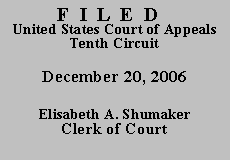

| UNITED STATES OF AMERICA,
Plaintiff-Appellee, v. GERALDO LEO ROGERS, Defendant-Appellant. |
|
The defendant appeals the district court's denial of his post-judgment motion in which he sought relief under Fed. R. Civ. P. 60(b) and the All Writs Act from his criminal conviction and sentence. We vacate the order for lack of jurisdiction, construe the defendant's notice of appeal, motion to proceed in forma pauperis, and appellate brief as an implied application for authorization to file another 28 U.S.C. § 2255 motion, and deny authorization.
The defendant's original § 2255 motion was denied by the district court in 1995. On appeal, this court affirmed. United States v. Rogers, No. 05-1519, 1997 WL 543365 (10th Cir. Sept. 3, 1997) (unpublished). In 1998, the defendant sought authorization to file another § 2255 motion. That request was denied. Rogers v. United States, No. 98-525 (10th Cir. Oct. 6, 1998) (unpublished). In 2002, the defendant filed a pleading entitled "Petition for Writ of Coram Nobis, or in the Alternative, Petition for Writ of Habeas Corpus Pursuant to Title 28 USC Section 2241 (c)(3) for Violations of the Constitution, Law and Treaties of the United States" in the district court. That court transferred the matter to this court as an unauthorized successive § 2255 motion. This court denied authorization. Rogers v. United States, No. 02-1416 (10th Cir. Dec. 5, 2002) (unpublished).
The defendant subsequently filed a pleading entitled "Rule 60(b)(4) Motion to Void Judgment of Conviction for Lack of Subject Matter Jurisdiction, or in the alternative, Pursuant Supreme Court in Gonzales v. Crosby (2005) to Grant Habeas Relief Due to Substantive Change to Appellate Rule 16(e)." The district court denied the motion as an unauthorized successive § 2255 motion. The defendant then filed a "Motion for Plaintiff to Show Cause Why This Court Did Not Lack Subject Matter Jurisdiction in this Instant Matter" and a motion to amend that pleading. The district court denied the motion as frivolous. The defendant then filed this appeal.
On appeal, the defendant challenges his convictions, arguing that there is no federal jurisdiction over the acts he is alleged to have committed and therefore the trial court lacked subject matter jurisdiction. The relief sought by the defendant may only be obtained through § 2255. See 28 U.S.C. § 2255 ("A prisoner in custody under sentence of a court established by Act of Congress claiming the right to be released upon the ground that ... the court was without jurisdiction to impose such sentence ... may move the court which imposed the sentence to vacate, set aside or correct the sentence.").
Because the defendant has already filed a § 2255 motion and a judgment has been entered in that proceeding, he must obtain authorization from this court before he may file another such motion in the district court. See United States v. Nelson, 465 F.3d 1145, 1147 (10th Cir. 2006) (a pleading asserting a new ground for relief is advancing a new claim and is therefore treated as a successive § 2255 motion under Gonzalez v. Crosby, 545 U.S. 524 (2005)).
Accordingly, the district court lacked jurisdiction over the defendant's post-judgment motions, and the district court orders must be vacated. See Nelson, 465 F.3d at 1146. However, we will construe the defendant's notice of appeal and the pleadings he filed in this court as a request for the required authorization. Id. at 1148.
We have thoroughly reviewed the matter and conclude that the defendant has failed to make the prima facie showing required by § 2255 as amended by the Antiterrorism and Effective Death Penalty Act. His contentions are not based on newly discovered evidence that, "if proven and viewed in light of the evidence as a whole, would be sufficient to establish by clear and convincing evidence that no reasonable fact finder would have found [him] guilty of the offense" or on a "new rule of constitutional law, made retroactive to cases on collateral review by the Supreme Court, that was previously unavailable." 28 U.S.C. § 2255.
The motion to proceed in forma pauperis is granted, the district court order is VACATED, and the implied application for authorization to file another § 2255 motion is DENIED. The mandate shall issue forthwith.
Entered for the Court
Per Curiam
*. This order and judgment is not binding precedent, except under the doctrines of law of the case, res judicata, and collateral estoppel. It may be cited, however, for its persuasive value consistent with Fed. R. App. P. 32.1 (eff. Dec. 1, 2006) and 10th Cir. R. 32.1 (eff. Jan. 1, 2007).